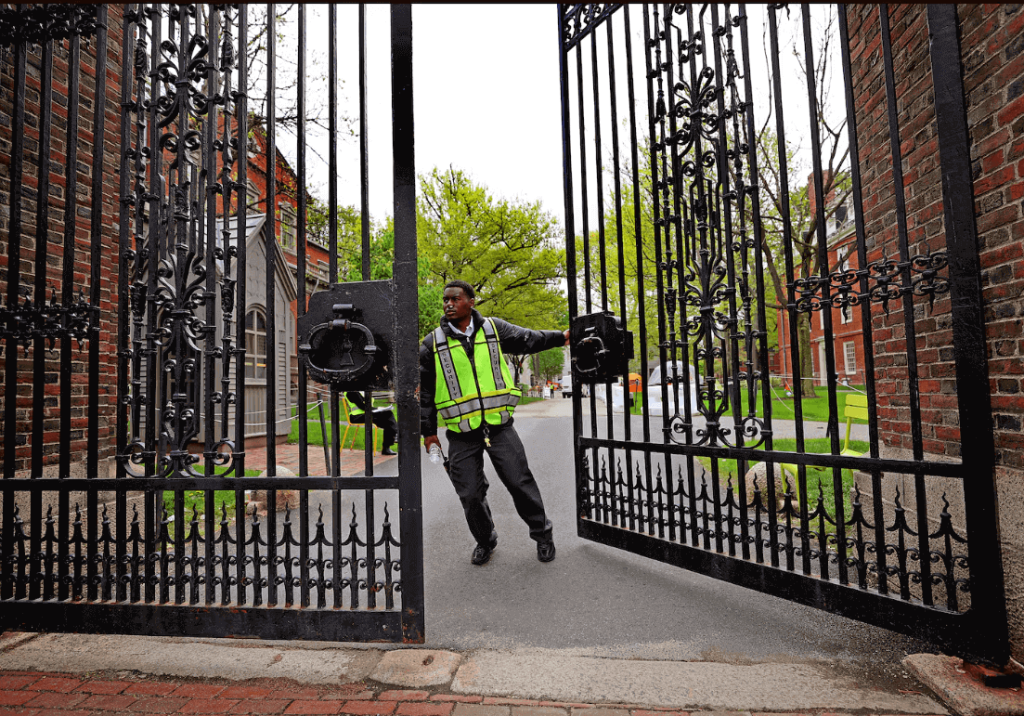【中美创新时报2024 年 9 月 30 日编译讯】(记者温友平编译)秋季学期刚开始几周,大学管理人员似乎就采取了强有力的措施,以避免去年春天因加沙战争而引发的喧闹抗议,该抗议活动曾成为全国头条新闻。新的或新实施的规定包括禁止在一天中的某些时段用粉笔写字、未经授权张贴传单、露营,以及在某些情况下禁止任何表达活动。包括哈佛大学在内的大学也表示,他们计划加强对表达活动的监控。《波士顿环球报》记者希拉里·伯恩斯(Hilary Burns)对此作了下述报道。
最近一个星期六,一群学生戴着头巾坐在哈佛大学主图书馆里,似乎在学习,笔记本电脑上贴着写着“想象一下它发生在这里”和“以色列轰炸哈佛付钱”的传单,以抗议以色列在黎巴嫩的轰炸。
大学领导层的反应很快:管理人员冲进来要求出示身份证,随后威胁要惩罚他们。
“他们保持沉默,没有阻止任何人进入,”哈佛大学政府学教授 Steven Levitsky 在谈到这些学生时说。“我的意思是,这在哪里发生?这种情况就发生在中国。”
秋季学期刚开始几周,大学管理人员似乎就采取了强有力的措施,以避免去年春天因加沙战争而引发的喧闹抗议,该抗议活动曾成为全国头条新闻。新的或新实施的规定包括禁止在一天中的某些时段用粉笔写字、未经授权张贴传单、露营,以及在某些情况下禁止任何表达活动。包括哈佛大学在内的大学也表示,他们计划加强对表达活动的监控。
更严格的限制让一些担心校园内犹太人安全以及上学期学术生活受到喧闹干扰的人松了一口气。但许多学生、教授和言论自由倡导者表示,严格的新规定相当于对言论和调查自由的不可容忍的限制,尤其是在战争时期,这代表着美国校园文化的巨大转变,几十年来,美国校园文化允许大多数大学校园的学生自由表达意见,几乎没有任何限制或规定。
“我们不知道在通过抗议、冲突和对话发展思想方面,哪些大门被关闭了,”哈佛大学历史学教授 Kirsten Weld 说。“这确实削弱了大学应有的使命。”
管理人员和一些学生表示,这些规则是对去年混乱局面的必要纠正,它们保护了去年遭受反犹太主义骚扰或认为抗议活动是一种无所不在的侮辱的犹太学生。大学管理人员一直受到来自保守派国会议员、知名捐助者和一些犹太团体的巨大压力,要求他们执行抗议限制。
爱默生学院三年级学生 Arthur Mansavage 是犹太人,去年春天,在宿舍附近举行了长时间的露营示威活动期间,他从宿舍搬进了学院出资的酒店房间。
“新政策将使情况变得更好,”他说。它们将“使学院对每个人都安全且正常运作。”
但许多支持言论自由的学生和教授表示,哈佛的事件以及其他类似事件都太过分了。他们指出,学生抗议活动对改变美国文化至关重要,例如帮助结束种族隔离和越南战争。
“在校园里,我们需要开放言论和辩论的规范,包括激烈的辩论、激烈的辩论和户外的大声抗议,”华盛顿特区美国大学教授协会总法律顾问、纽约州伊萨卡康奈尔大学教授丽莎·利伯维茨 (Risa Lieberwitz) 表示。
根据哈佛大学全校《权利和责任声明》,哈佛长期以来一直禁止“任何未经授权占用大学建筑或其任何部分的行为,以干扰大学成员开展正常活动的能力”。学生仍然可以在远离学术和住宅建筑的户外区域抗议,但活动必须提前登记,教授们表示,这违背了示威的自发性和破坏性。
哈佛大学发言人杰森·牛顿表示,大学管理人员“将继续收集有关最近怀德纳图书馆抗议活动的信息”,然后再“确定参与者的下一步行动”。哈佛大学拒绝让官员接受采访。
哈佛大学和美国其他地方的几位教授表示,在夏季大多数教授不在的情况下,管理人员重新审视言论限制时没有征求教职员工的意见。这些教职员工表示,这违反了大多数大学长期以来遵循的共同治理原则,该原则描述了管理人员和教授共同制定校园政策的决策过程。
“这个过程是不民主的,这些限制的内容也是不民主的,”利伯维茨说。
亚特兰大的埃默里大学在 8 月的一条消息中宣布,午夜至早上 7 点之间禁止抗议,这一新限制让一些教职员工感到不安。埃默里大学的一位发言人表示,长期以来一直“对抗议的时间、地点和方式进行合理限制”,以确保社区安全,同时专注于“我们的学术使命”。去年春天,许多抗议者聚集在一起,持续了一整天,并在清晨遭到警方突袭。
“当人们在四方院里四处走动谈论政治时,这算是抗议吗?”埃默里大学哲学教授诺埃尔·迈克菲 (Noëlle McAfee) 说道,他于 4 月在监视那里的亲巴勒斯坦人营地时被捕。“这是一项不连贯的政策,可以用来惩罚某些观点。基本上,这是不允许政府不喜欢的言论。”
印第安纳州美国公民自由联盟正在挑战印第安纳大学布卢明顿分校的一项类似新规定,该规定禁止在晚上 11 点到早上 6 点之间进行“表达活动”,并威胁要采取制裁措施,例如暂时停学。印第安纳州美国公民自由联盟表示,该规则“过于宽泛”,因为它可能包括不具破坏性的活动,例如默默地举着标语站着或穿着 T 恤。
“第一修正案的保护不会在晚上 11 点结束,也不会在早上 6 点重新开始,”印第安纳州美国公民自由联盟法律总监肯·福尔克 (Ken Falk) 在一份新闻稿中表示。
印第安纳大学的一位发言人拒绝发表评论,除了 7 月份的一份新闻稿,该新闻稿称“新政策支持不会实质性地扰乱大学运作或妨碍其他个人或团体表达活动的抗议和示威活动。”
在康奈尔大学,来自英国的博士生 Momodou Taal 因参加最近的亲巴勒斯坦抗议活动而面临被驱逐出境的风险,该抗议活动导致招聘会关闭。康奈尔大学发言人 Joel M. Malina 表示,大学“根据联邦法规,必须终止任何因纪律处分而不允许入学的学生的 F-1 [签证] 身份。”
康奈尔大学教授 Lieberwitz 表示,她对大学对 Taal 停学的处理“深表担忧”。
“无论大学管理部门如何坚称自己对内容保持中立,这类限制本质上都是由观点歧视所驱动的,”利伯维茨说。
然而,一些新限制的支持者表示,大学此前在遏制有问题的言论方面做得不够,他们怀疑大学是否会继续惩罚违反新规定的学生。
“我们对哈佛没有太大的信心,”哈佛大学应届毕业生沙博斯·凯斯滕鲍姆 (Shabbos Kestenbaum) 说,他于 1 月就哈佛大学对校园反犹太主义的回应起诉哈佛大学,指控学校纵容校园反犹太主义盛行。“如果他们想解决反犹太主义问题,他们 10 个月前就应该这么做了。”
学生组织者表示,他们准备测试新规则的极限。
“每个人都告诉我们在哪里可以示威、举横幅等,但抗议的目的是为了扰乱秩序,”麻省理工学院二年级学生凯特·皮尔斯 (Kate Pearce) 说。
哈佛大学“走出被占领的巴勒斯坦”在最近的一份新闻稿中表示,这个非官方学生团体“不会因反对种族灭绝而受到阻碍”。
“哈佛可以继续努力让学生保持沉默,但这只会增加我们对校园巴勒斯坦的支持,”HOOP 写道。其领导人没有回应置评请求。
前本科学院院长、计算机科学教授哈里·刘易斯 (Harry Lewis) 表示,哈佛大学领导人最好在澄清抗议规则之前寻求社区意见,包括教授的意见。
“除非学生接受这些原则,否则他们在监管这些事情方面总是比你更聪明,”他说。
2023 年 10 月 18 日,在哈佛商学院 Klarman Hall 后面的草坪上,一名男子在哈佛学生支持巴勒斯坦的抗议活动中举起了以色列国旗。
哈佛大学学术自由委员会联合主席刘易斯表示,去年春天在哈佛园举行的亲巴勒斯坦人集会扰乱了大学运作,其程度令人无法接受。尽管如此,他和另一位学术自由委员会联合主席、心理学教授史蒂芬·平克不同意这些规定的内容。
“虽然我支持哈佛大学维护其使命和中立性的努力,但我担心这些政策似乎没有考虑到相关的言论自由问题,”平克说。
本月早些时候,其他几位哈佛大学教授在哈佛园约翰·哈佛雕像附近的人行道上用粉笔写下信息,抗议大学对言论的限制。信息包括“为什么学龄前儿童比哈佛学生拥有更多的学术自由?”
参加了粉笔抗议活动的列维茨基说,教职员工团体没有受到正式纪律处分,但院长告诉他们不要再这样做了。
“我们的大学管理人员陷入困境,”列维茨基说。 “他们承受着很大的外部压力,但他们没有向学生坦白,更重要的是,他们没有向教师坦白。他们至少应该向我们解释一下为什么会发生这种情况。”
题图:哈佛大学的一名保安于 5 月关闭了哈佛大学的约翰斯顿门。今年秋天,哈佛大学将对抗议者实施更严格的限制。David L. Ryan/Globe Staff
附原英文报道:
Harvard, other universities crack down on Israel-Hamas war protests
Others contend new rules make campus life safer for all
By Hilary Burns Globe Staff,Updated September 30, 2024
A Harvard security guard closed the Johnston Gate at Harvard University in May. Harvard is enforcing tighter restrictions on protesters this fall.David L. Ryan/Globe Staff
On a recent Saturday, a group of students donned keffiyehs and sat inside Harvard’s main library, appearing to study with flyers that read “Imagine it happened here” and “Israel bombs Harvard pays” taped to their laptops to protest Israeli bombing in Lebanon.
The reaction from university leadership was swift: Administrators swept in and requested IDs, leaving the threat of punishment in their wake.
“They were silent, and they did not block anybody’s access,” said Steven Levitsky, Harvard professor of government, of the students. “I mean, where does this happen? This happens in China.”
Just a few weeks into the fall semester, college administrators appear to be taking strong measures to avoid the rowdy protests over the war in Gaza that made national headlines last spring. The new, or newly enforced, rules include restrictions against chalking, posting flyers without authorization, camping, and, in some cases, any expressive activity during certain hours of the day. Universities, including Harvard, have also said they plan to increase monitoring of expressive activity.
The tighter restrictions come as a relief to some concerned about Jewish safety on campuses and about last semester’s raucous disturbances to academic life. But many students, professors, and free speech advocates said the tough new enforcement amounts to an intolerable abridgment of free expression and inquiry, especially during times of war, and represents a massive shift in US campus culture, which for decades has allowed students on most college campuses to engage in free expression with few limits or regulations.
“We don’t know what kinds of doors are being closed in terms of the development of ideas through protest, conflict, and dialogue,” said Kirsten Weld, a Harvard history professor. “This really undercuts so much of what a university is supposed to be for.”
Administrators and some students say the rules were a necessary corrective to last year’s disruption and that they safeguard Jewish students who experienced antisemitic harassment last year, or felt the protests were an omnipresent affront. University administrators have been under immense pressure from conservative members of Congress, high-profile donors, and some Jewish groups to enforce protest restrictions.
Arthur Mansavage, a junior at Emerson College, who is Jewish, last spring moved out of his dorm into a hotel room, paid for by the college, during an extended encampment demonstration near his dorm room.
“The new policies are going to make things better,” he said. They will “make the college physically safe and operational for everyone.”
But many students and professors who support free expression said the incident at Harvard, and others like it, go too far. They note student protests have been critical to transforming US culture, such as by helping to end racial segregation and the war in Vietnam.
“On campuses, we need the norm to be openness around speech and debate, including vociferous debates, heated debates, loud protests outside,” said Risa Lieberwitz, general counsel of the American Association of University Professors in Washington, D.C., and a professor at Cornell University in Ithaca, N.Y.
Harvard has long prohibited “any unauthorized occupation of a university building, or any part of it, that interferes with the ability of members of the University to perform their normal activities,” according to Harvard’s University-wide Statement on Rights and Responsibilities. Students are still allowed to protest in outdoor areas away from academic and residential buildings, but events must be registered in advance, which professors say defeats the spontaneous and disruptive nature of demonstrations.
Jason Newton, a spokesperson for Harvard, said university administrators “will continue to gather information” about the recent Widener Library protest “before determining next steps regarding participants.” Harvard declined to make an official available for an interview.
Several professors at Harvard and elsewhere around the country said faculty were not consulted when administrators revisited expression regulations over the summer months, while most professors were away. These faculty members said this is a violation of the shared governance principles under which most universities have long operated, and which describe a joint decision-making process for campus policies by administrators and professors.
“It’s undemocratic in the process, and it’s undemocratic in the content of these restrictions,” Lieberwitz said.
Emory University in Atlanta announced in an August message that protests were prohibited between the hours of midnight and 7 a.m., a new limit that struck some faculty as troubling. A spokesperson for Emory said it has been a long-term practice to “place reasonable restrictions on time, place, and manner” of protests to keep the community safe while focusing “on our academic mission.” Many of the encampments last spring lasted all hours of the day and faced police raids early in the morning hours.
“When is it just people walking around quad talking about politics — is that a protest?” said Noëlle McAfee, an Emory philosophy professor who was arrested while monitoring a pro-Palestinian encampment there in April. “It is an incoherent policy that could be used to punish some views. Basically, it’s disallowing speech that the administration doesn’t like.”
The ACLU of Indiana is challenging a similar new rule at Indiana University Bloomington, a public university, which prohibits “expressive activity” between the hours of 11 p.m. and 6 a.m. and threatens sanctions, such as interim suspension from campus. The ACLU of Indiana said the rule is “overly broad” because it could include activity that isn’t disruptive, such as standing silently with a sign or wearing a T-shirt.
“The protections of the First Amendment do not end at 11:00 p.m., only to begin again at 6:00 a.m.,” Ken Falk, ACLU of Indiana legal director, said in a press release.
A spokesperson for Indiana University declined to comment beyond a July press release that said the “new policy supports protests and demonstrations that don’t materially and substantially disrupt university operations or hinder the expressive activity of another individual or group.”
At Cornell, PhD candidate Momodou Taal from Britain is facing the risk of deportation after he was suspended for participating in a recent pro-Palestinian protest, which shut down a career fair. Joel M. Malina, a spokesperson for Cornell, said universities are “required by federal regulation to terminate the F-1 [visa] status for any student who is not permitted to be enrolled due to a disciplinary action.”
Lieberwitz, the Cornell professor, said she has “serious concerns” about the university’s handling of Taal’s suspension.
“These kinds of restrictions are inherently driven by viewpoint discrimination, no matter how much the university administrations insist that they’re being content-neutral,” Lieberwitz said.
Some proponents of the new restrictions, however, said universities had previously not done enough to curtail problematic speech and are skeptical they will follow through on punishing students who violate the new rules.
“We don’t have a ton of confidence in Harvard,” said Shabbos Kestenbaum, a recent Harvard graduate who sued the university in January over its response to campus antisemitism, alleging the school allowed campus antisemitism to flourish. “If they wanted to tackle antisemitism, they would have done it 10 months ago.”
Student organizers said they’re prepared to test the limits of the new rules.
“Everybody tells us where we can demonstrate or hold banners or whatever, but the point of a protest is to be disruptive,” said Kate Pearce, a second-year student at the Massachusetts Institute of Technology.
Harvard Out of Occupied Palestine said in a recent press release that the unofficial student group “will not be deterred in our fight against genocide.”
“Harvard can continue to work to silence students, but it will only grow our support for Palestine on campus,” HOOP wrote. Its leaders did not respond to requests for comment.
Harry Lewis, a former dean of the undergraduate college and a computer science professor, said Harvard leaders would have been better off seeking community input, including from professors, before clarifying the protest rules.
“Students will always outsmart you on regulating these things unless they buy into the principles,” he said.
Lewis, a co-president of the university’s Council on Academic Freedom, said the pro-Palestinian encampment in Harvard Yard last spring disrupted university operations to an unacceptable degree. Still, he and another co-president of the Council on Academic Freedom, psychology professor Steven Pinker, disagree with the regulations as they are written.
“While I support Harvard’s efforts to safeguard its mission and neutrality, I’m concerned that these policies do not seem to have been formulated with attention to the relevant free-speech issues,” Pinker said.
Several other Harvard professors earlier this month chalked messages on sidewalks in Harvard Yard, near the John Harvard statue, to protest the university’s restrictions on expression. Messages included, “Why do preschoolers have more academic freedom than Harvard students?”
Levitsky, who participated in the chalking protest, said the faculty group did not face formal discipline but was told not to do it again by a dean.
“Our university administrators, they’re in a bind,” Levitsky said. “They are under a lot of external pressure, but they are not leveling with their students, and crucially, they’re not leveling with the faculty. They owe it to us, at least, to give us an explanation for why this is happening.”

